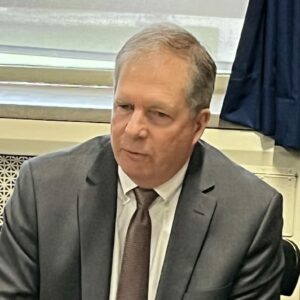During the First Congressional District debate on the Jack Heath radio show Tuesday, Republican Karoline Leavitt flatly said she did not trust the results of the 2020 elections, nationally or here in New Hampshire.
“I continue to be the only candidate in this race to say the 2020 election was absolutely stolen and there is no way Joe Biden legitimately won 81 million votes. That is a preposterous claim.”
And, Leavitt later added, the reason the state has Republican control at the state level but an entirely Democratic federal delegation “is because of our poor election integrity laws at the state level. We allow non-citizens of our state to vote in our elections.”
Most Granite Staters don’t agree with Leavitt’s claims regarding the 2020 election — 84 percent told the UNH Survey Center poll in July they are confident in the election process — but New Hampshire’s Secretary of State David Scanlan says there is a simple way for people skeptical about New Hampshire’s voting system to lay their concerns to rest.
“I would suggest people who are expressing doubts volunteer as poll workers,” Scanlan said.
Scanlan and his elections team are in the midst of a massive training effort to get 1,200 to 1,500 New Hampshire elections officials ready for the coming voting season. The primary vote is set for Sept. 13, and the midterms follow in November.
Asked by NH Journal about political candidates currently expressing doubt about the outcome of the 2020 election, Scanlan said the whole voting process is transparent and easy for anyone to observe.
“Any voter or citizen of New Hampshire who has questions about the election process should spend some time observing that process. It’s transparent from start to finish,” Scanlan said. “It’s all public activity done in the open with many checks and balances done at the polling place.”
There has never been any credible evidence of voter fraud in New Hampshire, but that has not stopped political candidates like Leavitt, Tim Baxter, and Don Bolduc from questioning the results of the 2020 election.
Baxter’s argument rests on the conspiracy theories laid out in the movie “2,000 Mules.” In fact, none of the First District GOP candidates were willing to say that former President Donald Trump lost the election during the NHJournal debate on August 4.
Bolduc, the frontrunner in the GOP race to take on Democratic Sen. Maggie Hassan, even signed an open letter this year questioning the 2020 election results.
“The FBI and Supreme Court must act swiftly when election irregularities are surfaced and not ignore them as was done in 2020,” the letter reads in part.
The 2020 election did see some glitches in the Granite State. For example, the months-long controversy in Bedford surrounding the 190 ballots that were never counted resulted in the secretary of state deciding the town will have a state-appointed official to oversee the September primary.
“As a result of the concerns and shortcomings described in this and our prior correspondences, the Attorney General makes a finding that the November 2020 General Election returns from Bedford had significant deficiencies,” Myles Matteson of the state Attorney General’s Election Law Unit wrote to Bedford town officials. “The Secretary of State, in consultation with the Attorney General, will be appointing an election monitor for the next election, the September 13, 2022, primary election.”
Scanlan wants to avoid any similar problems in the coming elections. The training for election officials will help the local moderators, ballot clerks, and selectmen understand election laws and get up to speed on any changes to the law from the last election.
The 2020 election saw polling stations swamped with absentee ballots due to the COVID-19 pandemic. Scanlan said there is unlikely to be a repeat of that issue this year. The training sessions are not mandatory, Scanlan said, but strongly encouraged.




